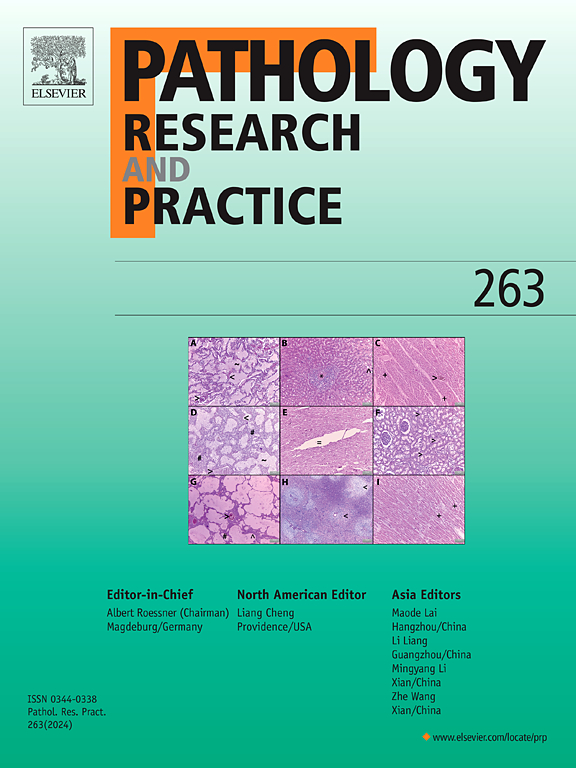Microbiota in cancer care: Clinical prospects
IF 3.2
4区 医学
Q2 PATHOLOGY
引用次数: 0
Abstract
Background
Probiotics and microbial metabolites exhibit dual roles in cancer biology, serving as both therapeutic agents and biomarkers. Lactobacillus species inhibit pathogen-driven tumorigenesis and predict immunotherapy efficacy, yet their depletion correlates with polycystic ovary syndrome (PCOS) and gastrointestinal cancers. Conversely, expansion of specific strains, such as L. plantarum 299 v, enhances iron absorption and mitigates mucositis. Similarly, Bifidobacterium modulates gut microbiota (GM) toward tumor suppression in colorectal cancer (CRC) and improves pediatric outcomes, though paradoxically rising in refractory multiple myeloma. Short-chain fatty acids (SCFAs) acetate, propionate, and butyrate protect against CRC via anti-inflammatory and epigenetic mechanisms, while Akkermansia muciniphila enhances immunotherapy responses in CRC and NSCLC through GM–tumor microenvironment crosstalk.
Objective
This mini review aimed to decipher the prospects of macromolecules in their role as anti cancer based on human clinical trials.
Interventions
Interventions include multi-strain probiotics, synbiotics, and dietary strategies (Mediterranean diets, fermented foods) that restore GM balance and boost SCFA production.
Limitations
Limitations persist on strain-specific variability, biomarker ambiguity, and inconsistent efficacy of probiotics in radiotherapy-induced diarrhea.
Recommendation
To address these, precision medicine approaches prioritizing strain-specific formulations, validated biomarkers, and combination therapies are advocated. Personalized nutrition and clinical tools further optimize outcomes.
Conclusion
Future research must clarify Akkermansia-TMAO interactions, SCFA epigenetic dynamics, and combinatorial regimens to harness microbiota–host crosstalk. By integrating advanced analytics and population-tailored strategies, microbiota-targeted interventions hold transformative potential in cancer prevention, therapy, and diagnostics.
微生物群在癌症治疗中的应用:临床前景
益生菌和微生物代谢物在癌症生物学中具有双重作用,既是治疗剂又是生物标志物。乳酸菌物种抑制病原体驱动的肿瘤发生并预测免疫治疗效果,但它们的缺失与多囊卵巢综合征(PCOS)和胃肠道癌症有关。相反,特定菌株的扩增,如L. plantarum 299 v,可以增强铁的吸收并减轻粘膜炎。同样,双歧杆菌调节肠道微生物群(GM)对结直肠癌(CRC)的肿瘤抑制作用,并改善儿科预后,尽管在难治性多发性骨髓瘤中矛盾地增加。短链脂肪酸(SCFAs)醋酸酯、丙酸酯和丁酸酯通过抗炎和表观遗传机制预防结直肠癌,而嗜粘Akkermansia muciniphila通过转基因肿瘤微环境串扰增强结直肠癌和非小细胞肺癌的免疫治疗应答。目的在人体临床试验的基础上,探讨大分子抗癌作用的发展前景。干预措施包括多菌种益生菌、合成菌和饮食策略(地中海饮食、发酵食品),以恢复转基因平衡并促进短链脂肪酸的产生。局限性:菌株特异性变异、生物标志物不明确、益生菌治疗放疗性腹泻疗效不一致等方面的局限性依然存在。建议:为了解决这些问题,人们提倡优先考虑菌株特异性制剂、经过验证的生物标志物和联合治疗的精准医学方法。个性化营养和临床工具进一步优化结果。结论未来的研究必须明确Akkermansia-TMAO相互作用、SCFA表观遗传动力学以及利用微生物-宿主串扰的组合方案。通过整合先进的分析和针对人群的策略,针对微生物群的干预措施在癌症预防、治疗和诊断方面具有变革性的潜力。
本文章由计算机程序翻译,如有差异,请以英文原文为准。
求助全文
约1分钟内获得全文
求助全文
来源期刊
CiteScore
5.00
自引率
3.60%
发文量
405
审稿时长
24 days
期刊介绍:
Pathology, Research and Practice provides accessible coverage of the most recent developments across the entire field of pathology: Reviews focus on recent progress in pathology, while Comments look at interesting current problems and at hypotheses for future developments in pathology. Original Papers present novel findings on all aspects of general, anatomic and molecular pathology. Rapid Communications inform readers on preliminary findings that may be relevant for further studies and need to be communicated quickly. Teaching Cases look at new aspects or special diagnostic problems of diseases and at case reports relevant for the pathologist''s practice.

 求助内容:
求助内容: 应助结果提醒方式:
应助结果提醒方式:


